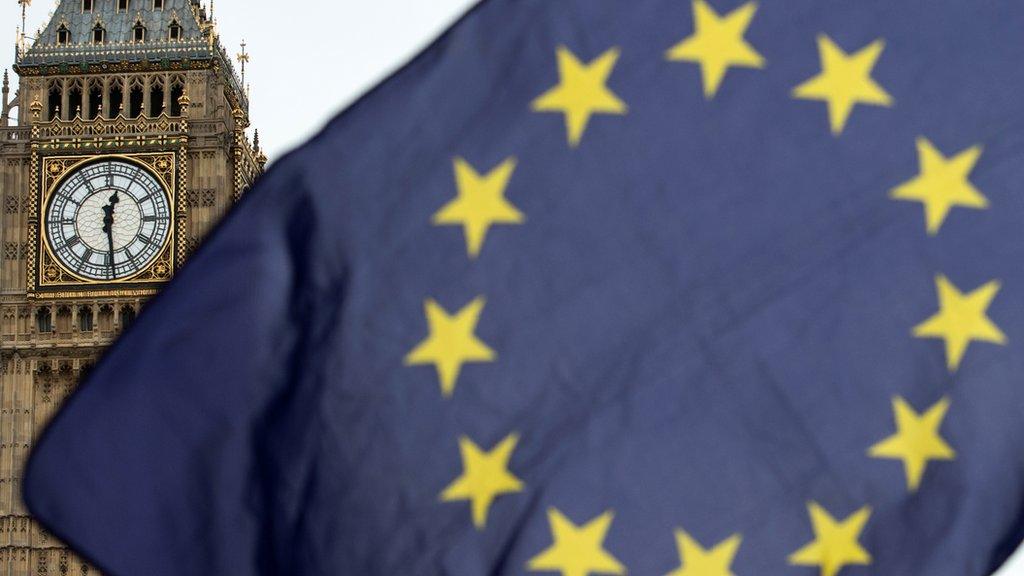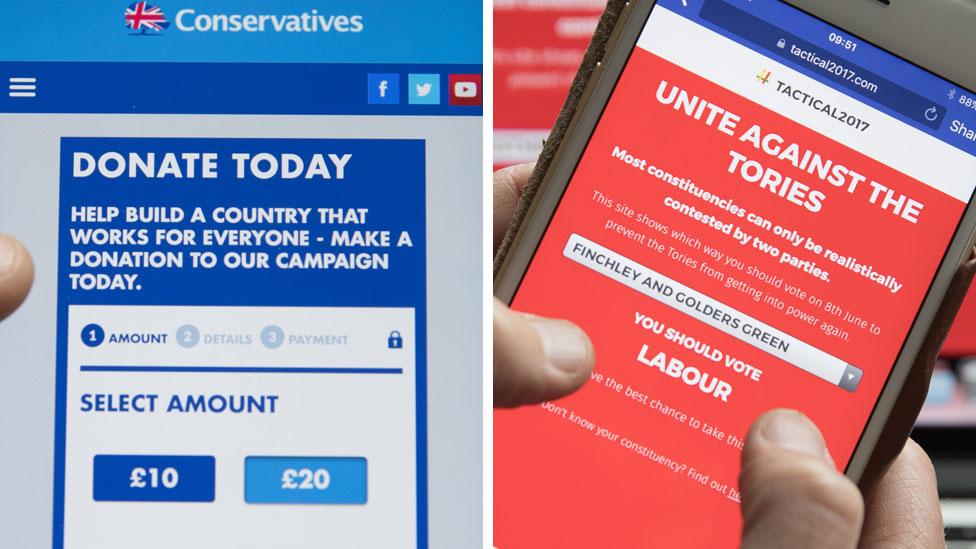Online Remainers: Can't agree who to vote for
- Published

How are hardcore online Remainers going to vote in the snap election?
One of the best ways to answer this question is to enter the pro-Remain Facebook sphere.
It is one of the largest "filter bubbles" in British politics, an increasingly divided group (dubbed "Remoaners" by their critics), that emerged during the European Union referendum campaign and expanded its online footprint in the run-up to this Brexit-centred snap election.
BBC Trending has been exploring the impact of social media on the general election. As part of this mission, we've gained access to multiple pro-Remain Facebook groups. The largest is "The 48%", with 60,000 members. Others include "Remain in the European Union", with 20,000 members and "Europeans" - a 12,000-strong group. There are multiple groups of this sort, and the pro-Remain filter bubble has hundreds of thousands of members.

The "Europeans" Facebook group has 12,000 members
They frequently clash about who to support in the upcoming snap election. One of the most interesting clashes involves polarised opinions about the Conservatives, between those who think the Tories want a hard Brexit, and those who think that a larger Tory majority will deliver a softer Brexit. Some have given up hope for their cause, whilst optimists have faith in the eventual emergence of a Macron-like saviour.
The pro-Remain community is different to the filter bubbles that we have explored so far. Inside Corbynista and Conservative bubbles, members usually post items that reinforce the dominant attitudes of the group, unlike the spats that rule the day inside pro-Remain groups.
"The infighting is terrible, to be honest," says Sean Gainford, who runs the "Remain in the European Union" Facebook group. He told Trending: "A lot of Remainers try to shut down debates. I was actually banned from a major pro-EU group, because the administrators didn't like some of the things I was saying. It's awful because it turns young people off politics."

Filter Bubble Britain: General Election coverage from BBC Trending

Over the course of the 2017 general election campaign, BBC Trending will be delving inside "filter bubbles" - tight online communities created by algorithms and the way we all use social media.
If you'd like to help report on online communities, email the BBC Trending team, external to express interest. We have a number of tools which will allow us to examine your own "filter bubble" on social media - but there's no commitment, all information will be anonymised, and we'll keep all of your personal information private.
Read our previous reports:

The Liberal Democrats have been branded as the main pro-Remain voice in the general election campaign, given that the party is advocating a second referendum on the terms of Brexit negotiations. Yet, there isn't universal support for the Lib Dems amongst online Remainers.
Some posts on "The 48%" painted the election as a binary choice between the Conservatives and Labour, and they're urging their compatriots to back the latter, although some Remainers are sceptical about the Labour Party.
A month ago, Gainford cancelled his Labour membership and joined the Lib Dems. "Corbyn simply won't be able to pull off an election upset," Gainford told Trending. "It's wake-up time for the liberal-left. We're in trouble for the next five years, frankly."
There is a conspicuous and quite bitter debate about Labour's attitude towards Brexit. Many members are hostile about Labour's recent announcements on Brexit - particularly the party's suggestion that freedom of movement would end under a Corbyn administration.
Meanwhile, though the Conservatives are widely criticised within these communities, some believe that Tory success on 8 June would actually deliver a more acceptable deal than the one currently promised. One user said he believed that a large Conservative majority could allow the prime minister to "get a softer Brexit past her hard-line backbenchers".
Others find hope in the example of France, with the recent election of the pro-EU Emmanuel Macron as the country's president. They find solace in the fact that Macron's spontaneous political movement has surpassed the traditional parties of the centre-left and centre-right. Remainers hope for a similar seismic shift in British politics in the near future.
Optimism is far from universal within these groups, however. Some believe that the 2017 election will end with further strains in the UK's relationship with the EU.
All of its members are in favour of the EU, but the pro-Remain filter bubble is far from united on what the future might bring.
Blog by Sam Bright

Also from Trending: Are you being targeted by political ads?

BBC Newsnight and BBC Trending and BBC local radio are working together to shed light on the role of social media advertising in the UK general election.
If you spot an advert or post in your social media feed which looks political then please send us a screengrab or a link to the content.
Please also tell us your age, gender, location, job and political affiliation (if you are happy to tell us). And please let us know if you are happy to be contacted by a BBC reporter.
Email:electionmessages@bbc.co.uk, external
Tweet:@bbcnewsnight, external or @bbctrending, external
SMS or WhatsApp: +44 7380 405603
All our stories are at bbc.com/trending.